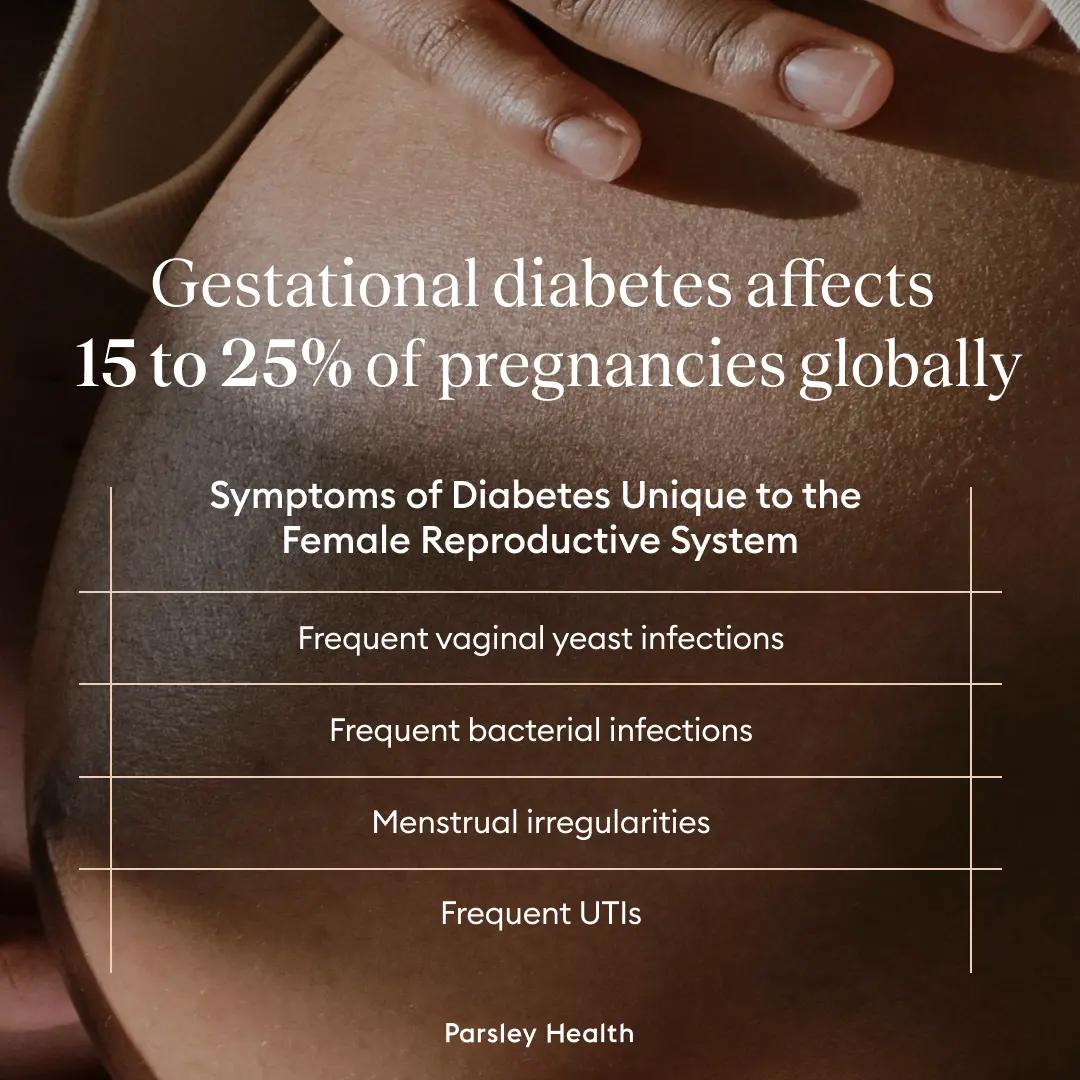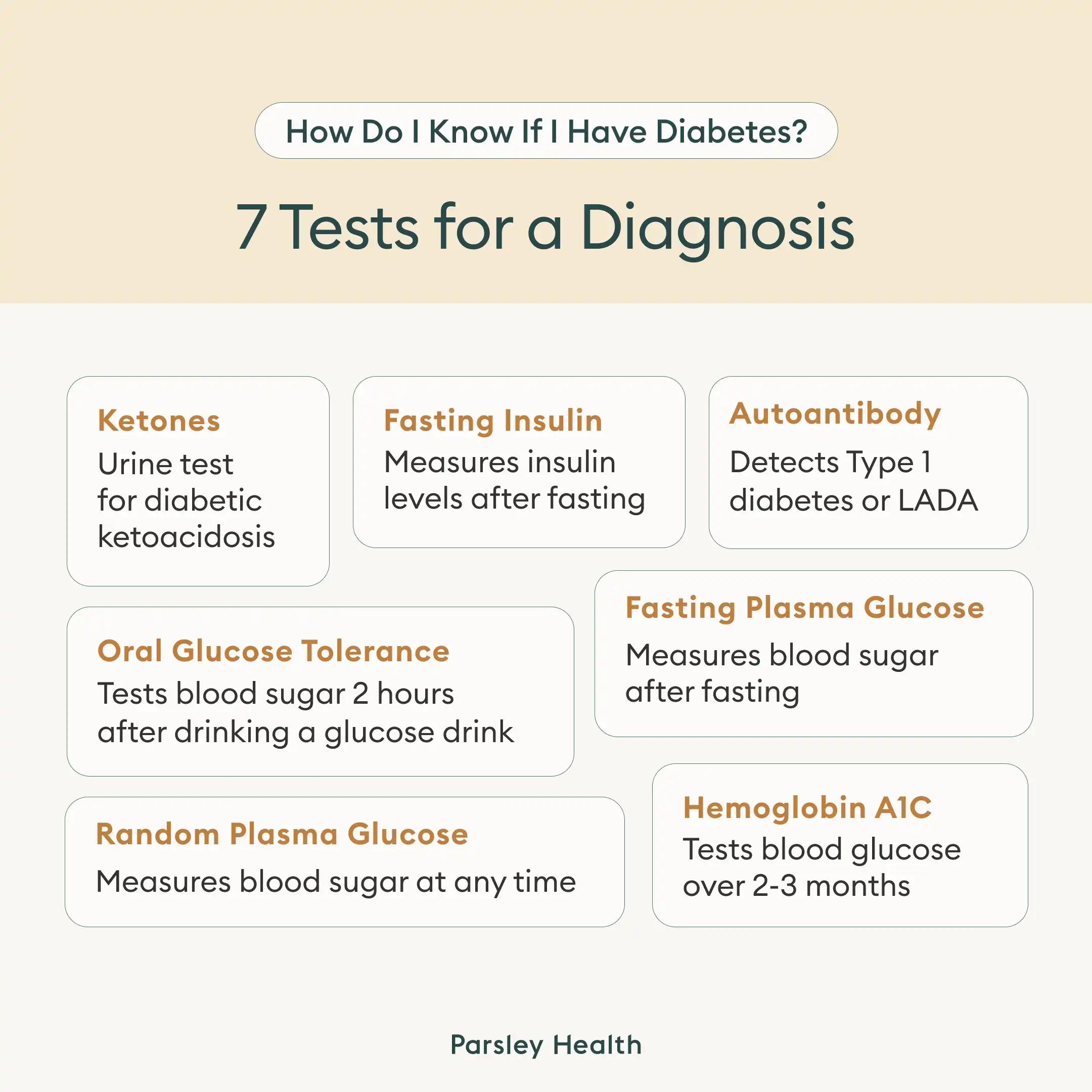Some symptoms of diabetes are unique to the female body. These include frequent vaginal infections and menstrual irregularities. These symptoms might be early signs that you’re developing issues with blood sugar control, and they warrant a conversation with a health care professional who can test you for prediabetes and diabetes.
Do you experience chronic vaginal yeast or bacterial infections, urinary tract infections (UTIs), menstrual irregularities, and skin concerns? Are you experiencing fertility issues? Aside from being frustrating or even heartbreaking, these symptoms are all potential early warning signs of diabetes in women, or people assigned female at birth.
But just because you have one or more of these symptoms does not mean you have diabetes. Still, you may wish to look into whether you might have prediabetes or diabetes since these conditions are common and many people don’t know they have them.
Some types of diabetes are reversible. Other types are autoimmune disorders, and even though they can’t be cured, treatment and management can help ease their symptoms.
“Although many general symptoms overlap for men and women, each sex can present certain unique concerns,” says Jabe Brown, MSc, a functional medicine practitioner and founder of Melbourne Functional Medicine in Australia. “Men may experience impotence or erectile dysfunction as an early warning sign, whereas women sometimes have more genital or urinary infections due to elevated blood sugar.”
The differences in the early warning signs, he adds, highlight the need for personalized checkups and care. In this article, we’ll explore types of diabetes, how diabetes may present differently for people assigned female at birth, and more.
Understanding diabetes in women
Diabetes is an umbrella term for a group of diseases that affect how the body processes glucose, which is necessary for giving us energy, and insulin, a hormone produced in your pancreas.
How your body manages glucose and insulin is a key factor in your metabolic health. Issues with this management can lead to long-term health problems, including cardiovascular disease, kidney issues, nervous system disorders, and more.
Not sure what your symptoms are really telling you?
The Parsley Symptom Index helps connect the dots across your whole body so you can understand patterns, not just isolated symptoms.
Types of diabetes in women
Understanding the underlying mechanisms of glucose and insulin management is crucial to understanding the different types of diabetes.
Your body gets glucose from some of the foods you eat, and it can also produce glucose through various methods. When glucose enters the bloodstream, your pancreas releases insulin, which signals to your cells, “Time to let glucose in!” Your cells then convert that glucose into usable energy—or they store it.
We get glucose in our diet mostly from consuming carbohydrates. That doesn’t mean that carbohydrates are “bad”—but the Standard American Diet involves ingesting too much-added sugar and processed carbohydrates, which dump a lot of glucose into the bloodstream at once, leading to blood sugar spikes. Our bodies can also convert some protein into glucose if needed.
Blood sugar spikes cause a surge in insulin from the pancreas to tell cells to let glucose in. However, if those cells are overloaded because they can’t use all that glucose, they begin to ignore insulin’s signal. This is called insulin resistance. As a result, blood sugar levels stay high. Likewise, insulin levels can stay high—which, in turn, can drive fat storage, leading to weight gain or obesity.
Additionally, the pancreas can get overtaxed from having to constantly produce and release insulin, and it can become less efficient at doing so, which can further raise blood sugar levels. High blood sugar, if left untreated, causes inflammation, which can damage blood vessels, nerves, tissues, and organs.
In Type 1 diabetes, which is an autoimmune condition rather than one related to lifestyle, the pancreas cannot produce insulin (or does not produce enough).
Here’s a more in-depth look at the different types of diabetes.
Prediabetes
Prediabetes occurs when someone is on a trajectory toward developing Type 2 diabetes. This means they’ve developed insulin resistance that is causing elevated blood sugar, but the level isn’t high enough to be classified as Type 2 diabetes. You’d receive a diagnosis of prediabetes if you have a fasting glucose level of 100 to 125 mg/dL or a hemoglobin A1C (hbA1c) of 5.7 percent to 6.4 percent.
If you don’t treat prediabetes, it eventually progresses to Type 2 diabetes. If you do treat it—with lifestyle changes (and medications, in some cases)—prediabetes can be reversed.
Nearly 40 percent of adults in the United States have prediabetes on glucose tests, yet only 1 in 5 of those with the condition have received a diagnosis.
Type 2 diabetes
Type 2 diabetes means the level of insulin resistance has progressed to what is sometimes called “full-blown” diabetes. This diagnosis occurs when fasting blood sugar reaches 126 mg/dL or higher or when hbA1c reaches 6.5 percent or more. You can also reverse Type 2 diabetes with the help of lifestyle changes and other treatments.
About 10 percent of adults in the United States have diabetes, and more than 90 percent of people with diabetes have Type 2.
Type 1 diabetes
Type 1 diabetes is an autoimmune condition, typically diagnosed in childhood or adolescence. It is characterized by the body’s destruction of the insulin-producing beta cells in the pancreas.
Without insulin, cells cannot access glucose to use for energy and blood sugar remains high, causing damage. People with Type 1 diabetes require the lifelong use of the medication insulin. Type 1 diabetes currently has no cure.
About 6 percent of adults in the United States have Type 1 diabetes.
Latent autoimmune diabetes in adults (LADA)
Latent autoimmune diabetes in adults (LADA) is sometimes called Type 1.5 diabetes. Like Type 1, LADA is an autoimmune disorder marked by the body’s destruction of insulin-producing cells.
However, instead of starting in childhood or adolescence, LADA typically begins in adulthood and slowly progresses. This delay in progression can sometimes lead to delays in diagnoses, and LADA is often misdiagnosed as Type 2 diabetes. LADA does not have a cure, and most people with the condition eventually need insulin.
Lance Bass, the singer of the famed boy band NSYNC, announced his LADA diagnosis in 2024. He is a classic example of someone who was originally diagnosed with Type 2, but he found that lifestyle changes were not helping his condition.
How many people have LADA in the United States is unclear. However, research suggests that about 10 percent of people diagnosed with Type 2 diabetes actually have LADA.
Gestational diabetes
Gestational diabetes is high blood sugar diagnosed in pregnancy. Those who are diagnosed with gestational diabetes are at a higher risk for developing Type 2 diabetes. Gestational diabetes, if left untreated, can lead to pregnancy complications.
“Many cases of gestational diabetes develop without obvious symptoms,” Brown says. “That’s why health guidelines recommend testing between the 24th and 28th week of gestation for individuals without a prior diabetes diagnosis.” Sometimes screening is necessary at the first prenatal visit, depending on a person’s risk factors, he adds.
Gestational diabetes affects 15 to 25 percent of pregnancies globally.

Common symptoms of diabetes
The following is a list of common diabetes symptoms. Keep in mind that many people with prediabetes or diabetes may not experience symptoms.
- Blurred vision or vision changes
- Dizziness or lightheadedness
- Fatigue or weakness
- Frequent infections
- Frequent urination
- Fruity-smelling breath
- Headaches
- Hunger or cravings
- Increased thirst
- Skin changes (dark patches, skin tags, or acne)
- Slow-healing wounds
- Tingling or numbness in the hands or feet
- Unexplained weight changes
Symptoms of diabetes unique to women
Some symptoms of diabetes are unique or more common in people assigned female at birth.
Frequent UTIs
UTIs can show up for several reasons and aren’t always a sign of diabetes. However, frequent UTIs may be an alarm bell. The characteristics of diabetes can impair the immune system, leading to more frequent infections. Additionally, nerve damage from diabetes can also lead to incomplete bladder emptying, giving bacteria more time to grow and cause an infection.
Frequent vaginal yeast or bacterial infections
Vaginal yeast infections and bacterial infections (such as bacterial vaginosis) may also show up more frequently in people with diabetes. High blood sugar can fuel yeast growth, and diabetes impacts the immune system and vaginal flora, making people more susceptible to bacterial infections.
Menstrual irregularities
The high blood sugar levels and insulin resistance that are present with prediabetes and Type 2 diabetes can lead to an overproduction of androgens (such as testosterone) in the ovaries and disrupt ovulation.
These symptoms are also common with polycystic ovary syndrome (PCOS). An estimated 21 percent of people with Type 2 diabetes also have PCOS, which is a leading cause of infertility.
Healing stories from our members
Risk factors
The risk factors for developing diabetes depend on the type. Here’s a breakdown.
Type 1 and LADA
- You have a family history or certain genes
Prediabetes and Type 2 diabetes
- You are 45 or older
- You consume the Standard American Diet
- You have a history of gestational diabetes
- You have metabolic dysfunction-associated liver disease (MAFLD)
- You have obesity or are overweight
- You live a sedentary lifestyle
- You have a parent or sibling with Type 2 diabetes
- You are Black, Hispanic or Latino, American Indian, or Alaska Native (Some Pacific Island and Asian American people may also have a higher risk.)
Gestational diabetes
- You had gestational diabetes during a previous pregnancy
- You gave birth to a baby weighing over 9 pounds
- You have obesity or are overweight
- You are over age 25
- You have a family history of Type 2 diabetes
- You have PCOS
- You are Black, Hispanic or Latino, America Indian, Alaska Native
How to know if you have diabetes
If you are experiencing any unusual symptoms, share your concerns with your health care provider. They can screen you for diabetes via the following tests.
Fasting plasma glucose. This blood test measures your blood sugar level after you’ve fasted (usually overnight) for at least eight hours.
Fasting insulin. This blood test measures your insulin level after you’ve fasted (usually overnight) for at least eight hours. It can show the presence of insulin resistance for many years before it shows up on a fasting glucose test.
Hemoglobin A1C (hbA1c). This blood test measures your average glucose over the previous two to three months by looking at the percentage of your red blood cells that have glucose attached to their hemoglobin protein.
Random plasma glucose test. This blood test checks your blood sugar at any given point in time, regardless of fasting. It is less reliable than a fasting glucose test since a recent meal or exercise can impact it. However, it may give clues to your provider that you need additional testing.
Oral glucose tolerance test. With this test, you’ll drink an oral glucose solution and then undergo a blood test two hours later to check your blood sugar level.
Autoantibody test. This blood test checks for Type 1 diabetes or LADA by looking for antibodies that destroy your insulin-producing cells.
Ketones test. This test requires a urine sample to check for ketone levels. High levels can indicate a condition called diabetic ketoacidosis, a complication of Type 1 diabetes and LADA.

Parsley Health offers physician-led functional medicine care, advanced lab programs, and flexible ways to get started, all designed to help you feel better over time.
Monitoring blood sugar levels
If you are diagnosed with prediabetes or a form of diabetes, managing blood sugar levels is important.
In some cases, you may be prescribed a continuous glucose monitor, which helps you see your blood sugar levels in real time. You can see how different foods affect your levels and how lifestyle changes, such as physical activity, help you manage your glucose. You can also check your blood sugar with the use of a glucometer, which involves a finger prick for a blood sample.
If you have Type 1 diabetes, you will need to take insulin. This is also the case for most people with LADA, depending on how far the condition has progressed. Monitoring your blood sugar will help you with managing your insulin injections.
Depending on the type of diabetes you have, your health care provider may treat you with certain medications or supplements that help lower your blood sugar.
Preventing and managing diabetes
Prediabetes and Type 2 diabetes can be prevented with lifestyle changes. These changes are also important if you have a prediabetes or a Type 2 diabetes diagnosis. They can help slow disease progression or even reverse the disease.
Lifestyle changes can also boost your overall health with Type 1 or LADA. For LADA, some lifestyle strategies can help you prolong your independence from insulin as much as possible and minimize how much insulin you may need.
Get regular physical activity
Physical activity, whether cardio exercise or strength training, allows your muscle cells to uptake glucose without the need for an insulin surge from the pancreas. This helps keep your blood sugar levels in check and improves your insulin sensitivity.
Going for a 30-minute walk or doing chores around the house after a meal can also help lower your post-meal glucose levels.
Eat balanced meals
Nutrition is a key component of managing all forms of diabetes. Eating for more stable blood sugar means you eat to avoid large blood sugar spikes. The following strategies can help.
- Limit your intake of ultra-processed foods, which are often loaded with processed carbohydrates and added sugar.
- Include more fiber in your diet and consume fiber-rich foods first at mealtime to help slow glucose absorption and help you feel fuller longer.
- Include adequate protein in your meals. This slows glucose absorption and aids in feelings of fullness.
- Add more healthy fats, such as omega-3 fatty acids, to your meals. These also help you feel fuller and improve cardiovascular health by reducing triglyceride levels.
Manage stress
Stress releases the hormone cortisol, which can cause blood sugar to spike and make insulin less efficient. Keep your stress levels in check through activities like meditation, yoga, spending time with loved ones, engaging in relaxing hobbies, exercising, and getting adequate sleep.
Get adequate sleep
A lack of quality sleep can impair your glucose control and leave you with more insulin resistance the next day. That’s why aiming for at least seven hours of relatively uninterrupted sleep is so important.
Work with a functional medicine practitioner
A functional medicine practitioner can help you manage your blood sugar levels in multiple ways.
They can review your diet to help ensure you’re eating for stable blood sugar while still getting adequate nutrition, including all the crucial vitamins and minerals that help support your metabolic health.
They can also help you improve gut health and other factors that help support your immune system, which can boost your overall health.
A functional medicine practitioner can also suggest safe and appropriate supplements, especially for prediabetes and Type 2 diabetes, that can lessen blood sugar spikes and stabilize your glucose levels. Possibilities include vitamin D, berberine, bitter melon, gymnema silvestre, and more. However, these should only be used under the guidance of a healthcare professional to avoid any toxicity issues or low blood sugar concerns.
Functional medicine practitioners can help you take a preventive approach or reverse prediabetes if you already have this diagnosis. In conventional medicine in the United States, doctors consider your blood glucose to be “normal” if it’s below 100 mg/dL.
However, if your fasting blood glucose is in the mid-90s, you may already have insulin resistance present and could eventually develop prediabetes. So a “normal” test result may not be “ideal.” However, in the United States, conventional medicine rarely treats prediabetes, let alone someone who almost has prediabetes.
Instead, treatment often begins when someone has “full-blown” Type 2 diabetes. At this point, reversal is more difficult and the body may have already undergone tissue damage.
Key takeaways
- Diabetes is an umbrella term for several diseases related to blood sugar and insulin.
- Prediabetes and Type 2 diabetes are preventable, while other forms are autoimmune diseases.
- Some symptoms of diabetes are unique to the female body, including increased vaginal infections and menstrual irregularities, which can be early signs of impaired blood sugar control.
- A functional medicine practitioner can help you prevent and potentially even reverse prediabetes and Type 2 diabetes.
FAQ
What are the three most common symptoms of undiagnosed diabetes?
The most common symptoms of undiagnosed diabetes will depend on what type of diabetes a person has. Common symptoms include blurred vision or vision changes, dizziness or lightheadedness, fatigue or weakness, frequent infections, frequent urination, fruity-smelling breath, headaches, hunger or cravings, increased thirst, skin changes, slow-healing wounds, tingling or numbness in the hands or feet, and unexplained weight changes.
How to stop diabetes before it starts?
Only some types of diabetes can be stopped before they even start. Prediabetes and Type 2 diabetes can be prevented through lifestyle changes, including those to diet, exercise, stress, and sleep.
How can a woman tell if she has diabetes?
The only way for anyone, of any gender, to confirm if they have diabetes is to undergo glucose testing; in some cases, other tests may also be necessary.
Does drinking water lower blood sugar?
Drinking water won’t directly lower your blood sugar levels. However, staying hydrated helps support your overall health.









